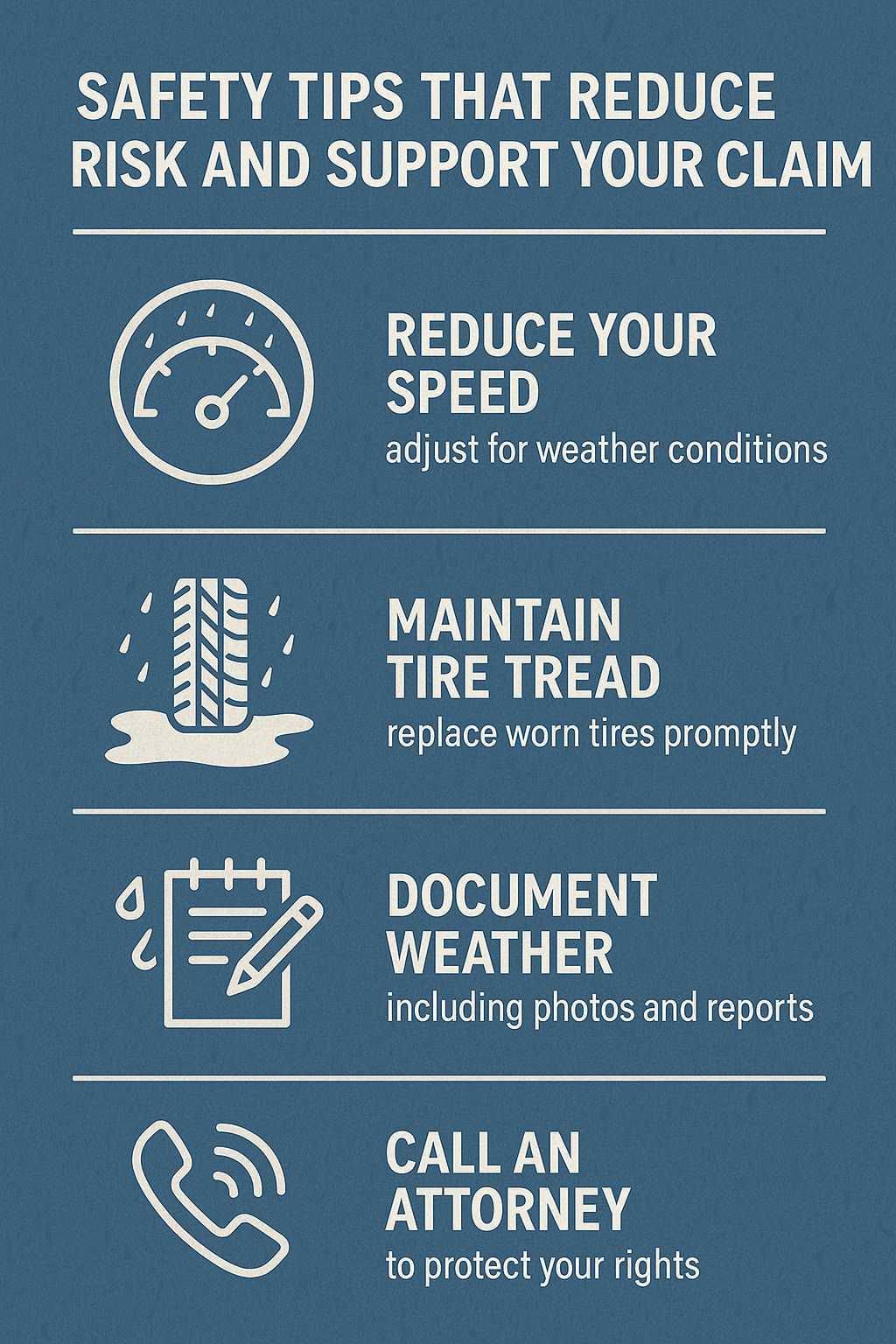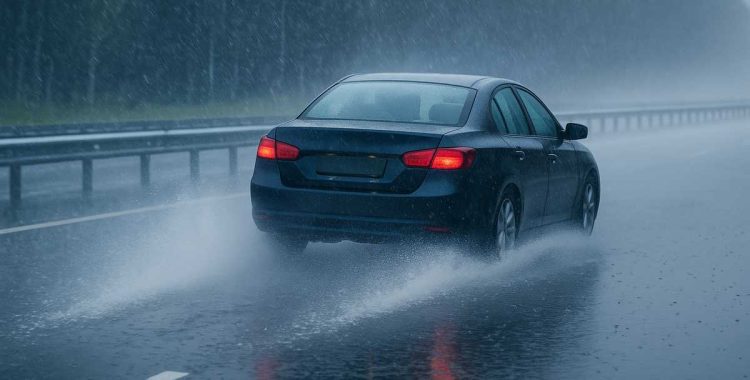Weather-Related Car Accidents in Texas
Texas drivers know that weather can shift in an instant. One moment skies are clear, and the next, heavy rain floods streets, fog settles on highways, or sudden ice makes bridges slick. These conditions create dangerous road situations, and too often, drivers in Houston, Dallas, Austin, and beyond find themselves in serious crashes because of poor weather conditions.
In late August, Houston Chronicle reported flash floods across southeast Houston, stranding cars near Woodridge Drive and the Gulf Freeway. Officials reminded drivers of a life-saving rule: Turn Around, Don’t Drown. Even shallow water can stall your vehicle or sweep it away.
So what happens when you’re injured in a weather-related crash? Who is responsible? Let’s break down how Texas law handles bad weather accidents, what evidence matters, and how you can protect yourself with a car accident lawyer for weather-related crashes.
Common Weather Conditions That Cause Crashes
Heavy Rain and Wet Pavement
Rain is the number one cause of weather-related crashes in Texas. Wet pavement leads to hydroplaning, longer stopping distances, and reduced traction. Drivers who fail to slow down or leave extra space create serious risk.
Flash Flooding
Flash floods hit Houston neighborhoods and underpasses fast. Vehicles stall or get swept away when drivers try to push through water. In many personal injury cases, evidence shows that drivers ignored barricades or warning signs. Those decisions matter when determining fault.
Fog
Fog crashes in Texas often involve chain-reaction pileups on highways like I-35 or rural farm-to-market roads. Visibility can drop to near zero, making safe driving behaviors—slowing down, using low beams, and increasing following distance—essential.
Ice and Sleet
In North Texas and even occasionally in Houston, icy bridges and overpasses cause sudden loss of control. A driver who continues at full speed in these conditions can still be held liable under Texas law.
High Winds and Hail
Strong winds push vehicles, especially trucks, into other lanes. Hail often causes sudden braking or swerving, leading to collisions.
Texas Law and Duty of Care
Under Texas Transportation Code §545.351, drivers must travel at a speed that is “reasonable and prudent” for the road conditions. That means speed limits are not a free pass—drivers are expected to adjust based on weather conditions.
For commercial truck drivers, federal rules go further. Federal Motor Carrier Safety Regulations require “extreme caution” during hazardous weather. If conditions become unsafe, drivers must reduce speed or stop completely. Failure to follow these rules can support liability in personal injury cases.
Texas follows a comparative fault system. If you are less than 51% responsible for the accident, you may recover damages. If you are 51% or more at fault, you cannot recover compensation. This is often called the Texas comparative fault 51% rule.
For example:
- Driver A is speeding on slick roads during a thunderstorm.
- Driver B changes lanes without signaling.
- If both actions contributed, a court or insurance company may split fault. If Driver A is found 60% at fault, they cannot recover damages. Driver B, at 40% fault, could still recover 60% of their losses.
Evidence That Strengthens Your Case
Proving negligence in poor weather conditions requires strong evidence. Common examples include:
- Police reports that document weather conditions and traffic violations.
- Photos and videos showing road conditions, standing water, fog, or debris.
- Dash cam or surveillance footage that captures driving behaviors.
- Weather data from the National Weather Service confirming rainfall totals, advisories, or dense fog warnings.
- Witness statements about speed, headlights, or following distance.
This evidence shows whether drivers responded reasonably to adverse weather conditions or ignored the risks.
How Insurance Companies Handle Weather Claims
Insurance companies often argue that “the weather caused the accident” to avoid paying fair compensation. They may claim it was an “act of God.” But Texas law doesn’t excuse unsafe driving just because of poor weather conditions. Drivers are expected to adapt to the situation.
This is why contacting a personal injury attorney early is critical. An attorney can challenge these arguments, gather supporting evidence, and push back when insurance companies try to reduce or deny claims.
If you’re in a crash during bad weather, follow these steps to protect your health and your legal rights:
- Call 911 and request medical help.
- Document the scene—take pictures of the vehicles, road conditions, and surroundings.
- Collect information—exchange details with other drivers and get contact info from witnesses.
- Seek medical care even if injuries seem minor.
- Avoid admitting fault at the scene or to insurance companies.
- Consult a personal injury attorney before giving recorded statements or signing paperwork.
When Commercial Trucks or Government Entities Are Involved
Weather-related crashes involving 18-wheelers or government vehicles are more complex.
- Trucking companies may be liable if a driver ignored safety rules or was pressured to meet deadlines.
- Government entities may share liability if poor drainage, missing warning signs, or untreated icy roads contributed. These cases often have shorter filing deadlines, making it important to act quickly.
Statutes and Time Limits in Texas
- Personal injury lawsuits usually must be filed within two years of the accident under Texas law.
- Claims against government entities can require much earlier notice.
- Acting fast preserves evidence and protects your rights.
Safety Tips That Reduce Risk and Support Your Claim
- Slow down in heavy rain and fog.
- Increase following distance on slick roads.
- Always use headlights in poor weather conditions.
- Avoid cruise control on wet or icy pavement.
- Keep tires, brakes, and windshield wipers in good condition.
- Never drive through floodwater—turn around instead.
These behaviors not only keep you safe but also demonstrate that you acted responsibly if a claim arises.

Call us for a free case review
Weather-related car accidents in Texas are common, but drivers cannot blame the weather alone. Liability depends on whether drivers acted reasonably for the conditions. Heavy rain, fog, flooding, and ice make the roads dangerous, but unsafe driving behaviors cause crashes.
If you or a loved one has suffered a car accident injury during adverse weather conditions, our team at Universal Law Group can help. We understand how weather conditions impact liability, and we know how insurance companies try to shift blame.
Contact us today for a free consultation. We’ll review your case, explain your options, and fight for the compensation you deserve.




